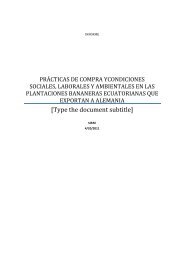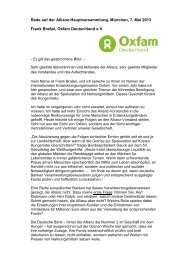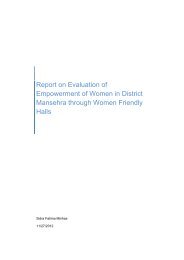No Time to Lose - Oxfam
No Time to Lose - Oxfam
No Time to Lose - Oxfam
Create successful ePaper yourself
Turn your PDF publications into a flip-book with our unique Google optimized e-Paper software.
who have committed violations; whether the state trains its security<br />
forces in international humanitarian law; and whether mechanisms<br />
are in place <strong>to</strong> ensure accountability for violations of international<br />
humanitarian law committed by the armed forces. 94<br />
ANSF activity that involves the unlawful killing or injury of civilians,<br />
arbitrary detention or cruel, inhuman or degrading treatment or punishment<br />
may amount <strong>to</strong> serious violations of international humanitarian<br />
law and/or repression as defined by the Common Position. EU<br />
member states are required <strong>to</strong> deny the provision of military equipment<br />
or technology <strong>to</strong> the ANSF if there is a clear risk that the equipment/technology<br />
might be used in this manner.<br />
While the term ‘military technology and equipment’ includes instruction<br />
or training in the use of such equipment 95 - this does not encompass<br />
general training, men<strong>to</strong>ring or institutional development for foreign<br />
security forces. Even if it did, the provision of training (or men<strong>to</strong>ring,<br />
or institutional development) does not require an export licence,<br />
and thus the Common Position – which sets the criteria upon<br />
which EU member states must deny an export licence – has no application.<br />
In other words, member states providing training <strong>to</strong> the<br />
ANSF, either bilaterally or as part of NTM-A or EUPOL, are under no<br />
obligation <strong>to</strong> consider the matters that they would be obliged <strong>to</strong> consider<br />
if providing military equipment. As EU member states move<br />
away from the provision of military equipment and <strong>to</strong>wards a greater<br />
focus on training and institutional development, this leaves a critical<br />
gap in the EU’s policy framework for security sec<strong>to</strong>r reform.<br />
The obligation of commanders <strong>to</strong> prevent violations of international<br />
humanitarian law<br />
In international armed conflicts, military commanders have a legal<br />
obligation <strong>to</strong> take action <strong>to</strong> prevent violations of international humanitarian<br />
law by members of their armed forces or persons under their<br />
control. 96 While there is no corresponding obligation in noninternational<br />
armed conflict, some states, including the US and Germany,<br />
require members of their armed forces <strong>to</strong> comply with the full<br />
range of obligations under international humanitarian law in all conflicts<br />
howsoever characterised – thus implicitly recognising the commander’s<br />
obligation <strong>to</strong> take action <strong>to</strong> prevent violations of international<br />
humanitarian law in all armed conflicts. 97<br />
The military manuals and/or defence policies of some states also explicitly<br />
require military commanders <strong>to</strong> report and in some cases <strong>to</strong><br />
take action <strong>to</strong> prevent violations of international humanitarian law.<br />
US soldiers are required <strong>to</strong> ‘do their best <strong>to</strong> prevent violations of the<br />
law of war’, and <strong>to</strong> report actual or suspected violations <strong>to</strong> their superior.<br />
98 US Department of Defense policy requires that all ‘possible,<br />
21







![Download: Faltposter EU-Handelspolitik [PDF 2,17MB] - Germanwatch](https://img.yumpu.com/25095854/1/190x161/download-faltposter-eu-handelspolitik-pdf-217mb-germanwatch.jpg?quality=85)








